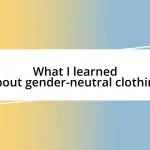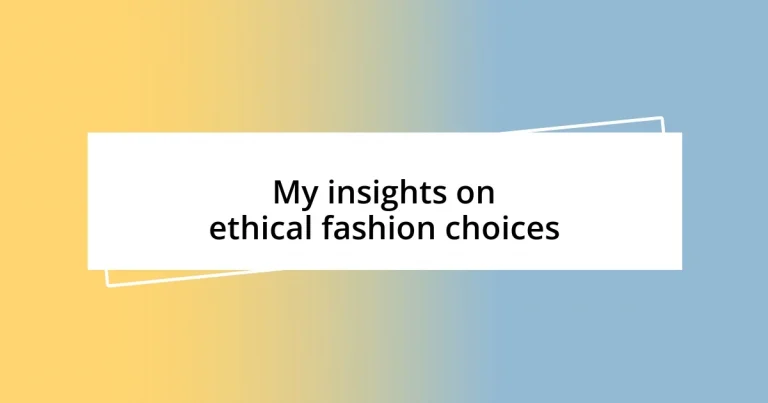Key takeaways:
- Understanding ethical fashion involves recognizing the impact of clothing choices on people and the planet, emphasizing transparency and accountability in the supply chain.
- Choosing sustainable materials not only reduces environmental impact but supports fair trade practices, promoting a mindful relationship with fashion.
- Advocating for industry change empowers consumers to demand ethical practices from brands, highlighting the collective influence in reshaping the fashion industry.
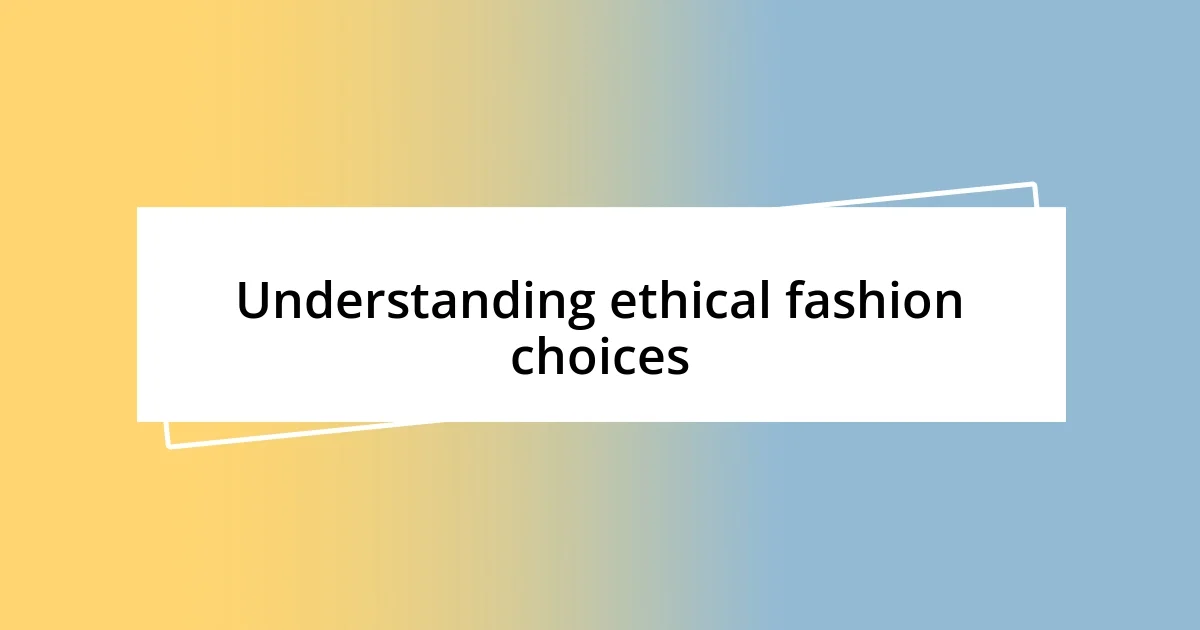
Understanding ethical fashion choices
Understanding ethical fashion choices involves recognizing the broader impact of our clothing purchases on people and the planet. I remember when I first realized that the shirt I loved was made in unsafe working conditions; it completely shifted my perspective. Have you ever thought about who made your clothes and how they were treated?
Moreover, ethical fashion isn’t just limited to using sustainable materials or fair labor practices; it’s also about transparency and accountability in the supply chain. When I started following brands that shared their sourcing stories, I felt a connection to the craftspeople behind the garments. Isn’t it remarkable to think that our choices can empower a community?
To truly embrace ethical fashion, we need to redefine what we consider “style.” For me, opting for timeless pieces over fleeting trends has become a form of self-expression that aligns with my values. Each item I choose tells a story—doesn’t that add depth to your wardrobe? The journey towards ethical choices is personal, but it connects us all in striving for a more compassionate and responsible industry.
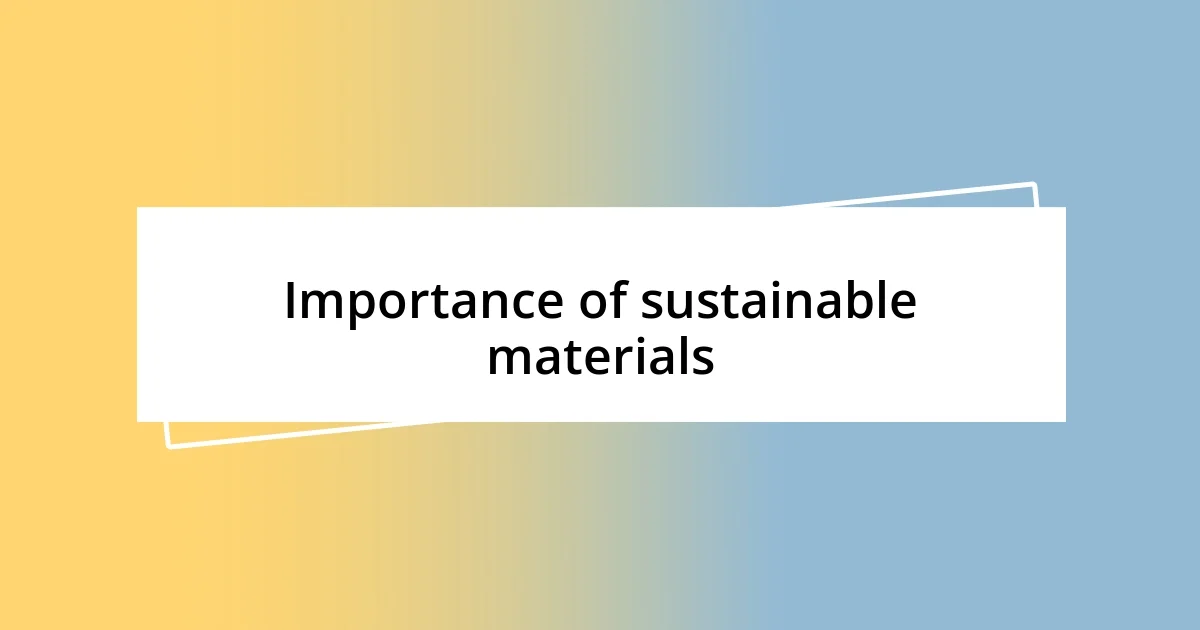
Importance of sustainable materials
Choosing sustainable materials is crucial for fostering a healthier planet. I’ve often felt a sense of relief when I wear clothes made from organic cotton or recycled fabrics. It’s empowering to know that my choices support environmental stewardship instead of depleting resources. Each time I swap fast fashion for sustainable options, I feel like I’m making a small yet significant contribution to positive change.
Here are some reasons why sustainable materials matter:
- Reduce Environmental Impact: Sustainable materials often use less water and chemicals in production, lowering pollution levels.
- Support Biodiversity: By choosing organic or natural fibers, we help protect ecosystems that might otherwise be harmed by conventional farming practices.
- Promote Fair Trade: Many sustainable fabrics are produced under fair trade practices, ensuring that workers receive fair wages and safe working conditions.
- Durability and Quality: Sustainable materials tend to be more durable, meaning they last longer and reduce the need for constant replacement.
- Encourage Mindful Consumption: Opting for sustainable options fosters a mindset of quality over quantity, allowing for a more meaningful relationship with our wardrobes.
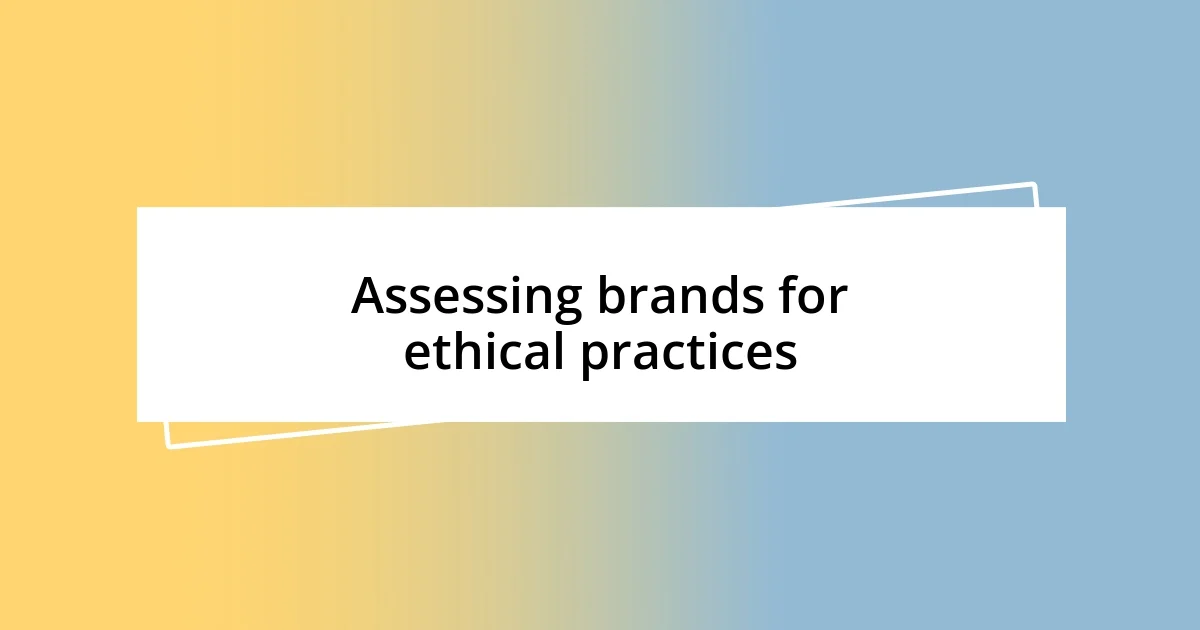
Assessing brands for ethical practices
Assessing brands for ethical practices can initially seem overwhelming, but I’ve found that a methodical approach makes the process a lot clearer. One powerful insight I’ve gathered is the importance of examining how brands disclose their policies. I remember feeling a sense of assurance when I stumbled upon a brand’s website that detailed their sustainability journey and ethical commitments. This transparency demonstrates accountability and builds trust between consumers and companies—don’t you agree that showing their cards is essential for a brand in this day and age?
Moreover, I’ve learned that certifications can be vital indicators of a brand’s ethical standing. Keep an eye out for recognizable seals like Fair Trade or GOTS. When I buy from brands that showcase these certifications, I feel a deeper sense of responsibility, knowing my choices align with dignified labor practices. It’s like wearing my values; however, not every certification holds the same weight, so I always delve a bit deeper to evaluate their genuine impact.
Additionally, I find that taking a holistic view of a brand’s practices is crucial. This encompasses everything from labor conditions to environmental stewardship. I recall a conversation with a friend who was shocked to learn that a well-known brand, despite its eco-friendly products, didn’t pay its workers fair wages. It’s essential for me to consider the complete picture; after all, our choices can either support ethical labor or perpetuate exploitation.
| Brand Name | Certifications |
|---|---|
| Brand A | Fair Trade, GOTS |
| Brand B | None |
| Brand C | OEKO-TEX, B Corporation |

Making informed purchasing decisions
When it comes to making informed purchasing decisions in fashion, I always strive to ask a simple yet powerful question: “Who made my clothes?” Reflecting on this has shifted my perspective dramatically. Recently, while shopping, I found myself gravitating towards a brand that not only had a robust sustainability statement but also included profiles of the artisans who crafted their products. It felt incredible to connect with the people behind the clothing; it added layers of meaning to my purchases.
Another approach I value is staying informed about the materials used in the garments I’m considering. I’ll never forget the rush I felt when I discovered a beautiful dress made from TENCEL™, a fiber produced from sustainably sourced wood. Researching how it’s made showed me a process that respects the environment while delivering on quality. Wouldn’t you feel good knowing your outfit has a story that’s about sustainability instead of exploitation?
Finally, embracing a mindset of intentionality has transformed how I shop. I used to be drawn in by trendy pieces, but now I pause to consider whether they truly align with my ethics and long-term goals. Last month, I chose to invest in a timeless jacket rather than buy several cheaper options that I would likely discard after a season. That was an emotional decision for me, knowing that by opting for quality over quantity, I was not just buying a piece of clothing—I was making a statement about my values and encouraging a shift in the industry towards more mindful production.
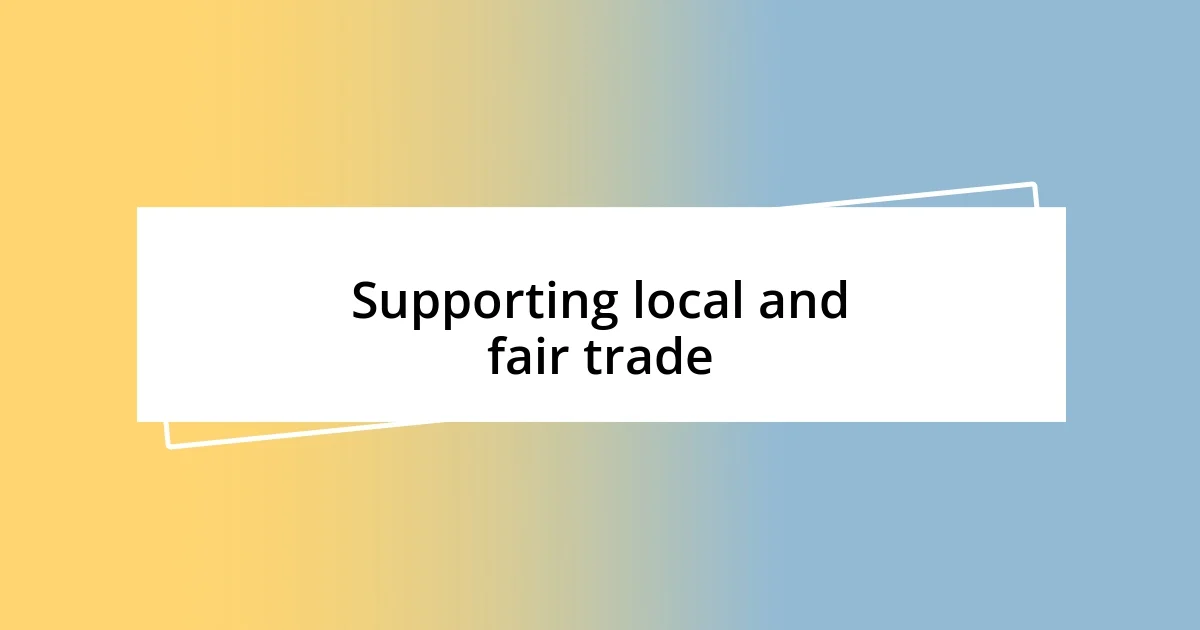
Supporting local and fair trade
Supporting local artisans and fair trade practices has become a cornerstone of my fashion philosophy. When I discovered a nearby workshop that produced beautiful handwoven textiles, I felt a sense of connection that I hadn’t experienced before. Each piece is not just a garment; it embodies stories, culture, and craftsmanship. Isn’t it satisfying to wear something that supports local livelihoods rather than global mass production?
In my journey toward ethical fashion, I’ve also come to appreciate the importance of fair trade certifications. For instance, while browsing at a market, I found a charming pair of earrings made from repurposed materials. The vendor shared how fair trade ensured that her artisans received fair pay and safe working conditions. It was a real eye-opener for me—could my choices truly help uplift communities? The answer was a resounding yes!
I remember a time when I impulsively bought a trendy sweater online, only to later realize it was produced overseas with little regard for workers’ rights. This taught me the value of mindful shopping. Since then, I’ve prioritized brands that actively support local economies and operate transparently, allowing me to feel empowered in my purchases. Isn’t it a wonderful feeling to know that your clothing choices contribute to a greater good, rather than detracting from it?
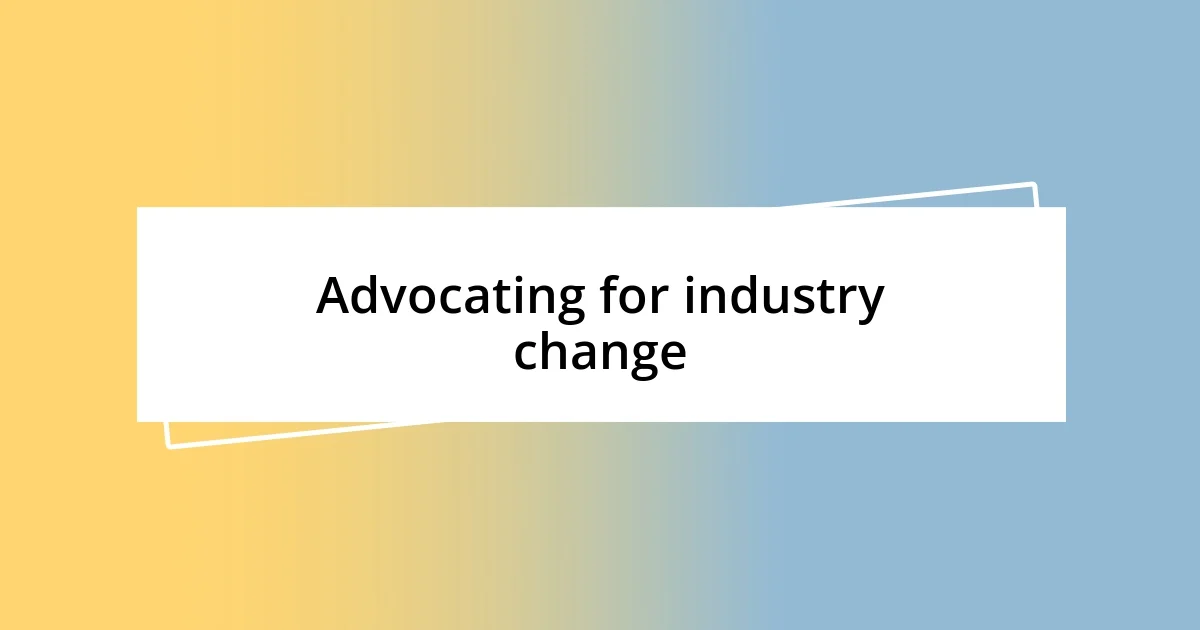
Advocating for industry change
Advocating for industry change is about taking a stand and demanding better practices from brands. I’ll never forget attending a sustainability conference where industry leaders discussed the power consumers hold. It was a revelation; when we voice our concerns—be it through social media or direct communication with brands—we push for transparency and ethical practices. Isn’t it astonishing that our collective voices can reshape an entire industry?
One time, I joined an online petition urging a popular retailer to adopt more sustainable sourcing methods. As I clicked “submit,” I felt empowered to contribute to a movement bigger than myself. It reminded me that change often requires pressure from informed consumers like us. When we engage with brands, we highlight the demand for eco-friendly practices, which can lead to real shifts. Can you imagine if every consumer took that step?
Participating in community workshops focusing on fashion activism has also helped me to understand the underlying issues within the industry. I recall a particularly eye-opening session where the facilitator discussed the harmful impacts of fast fashion. It struck a chord with me—like a call to action. We’re not just advocating for better products; we’re championing ethical treatment of workers and sustainable environmental practices. Each small effort contributes to a larger wave of change. How powerful it feels to be part of this evolving conversation!






